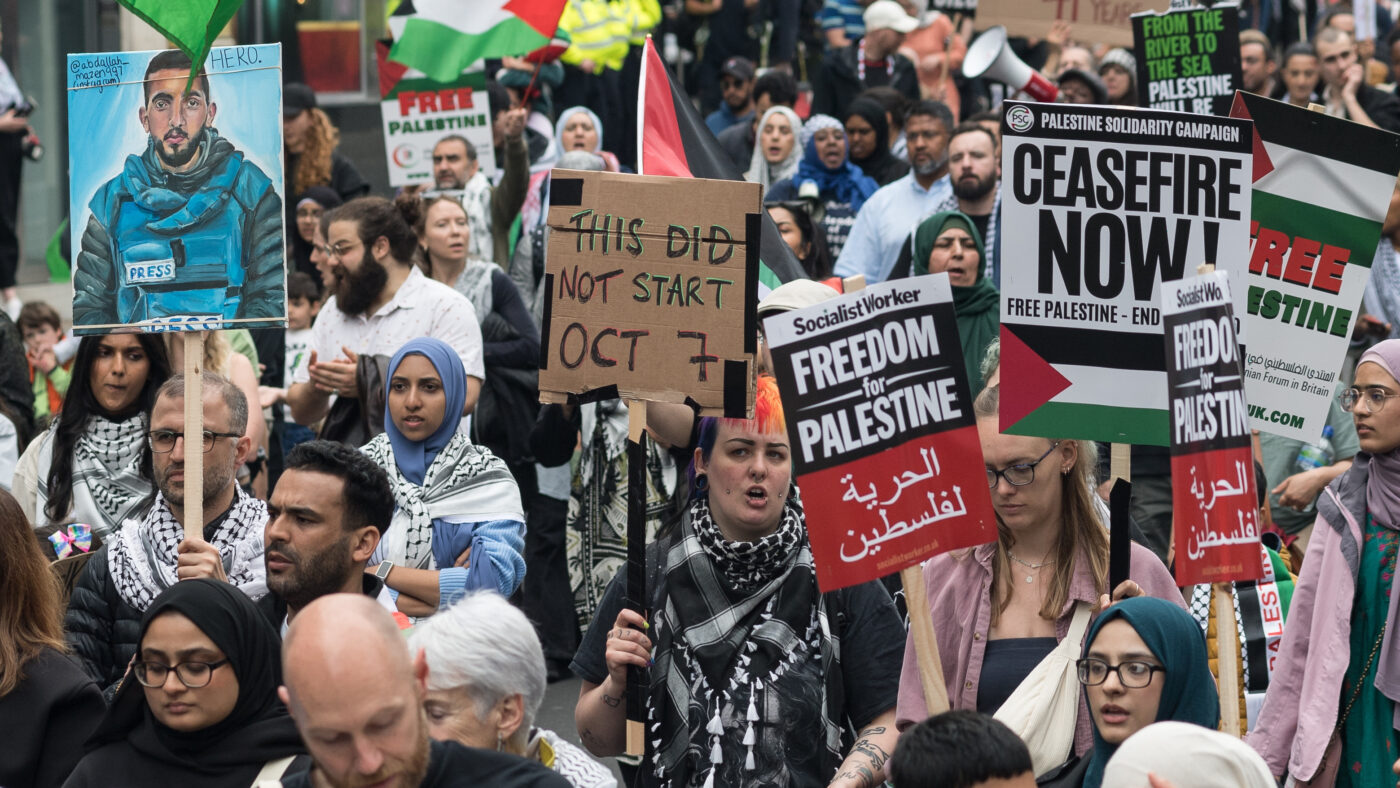The Prime Minister knows, rain or shine, the only place to make the case for things that matter to him and to the nation is outside his front door. His previous foray, then in fairer weather, took place on March 1 in the aftermath of George Galloway’s election victory when he warned democracy was being targeted by extremists who hijacked the political process and protests to undermine democratic values.
Ironic, really, that the starting gun for the general election on Wednesday was almost drowned out by a protest song blaring on a loudspeaker just beyond the gates to Downing Street.
Whatever you make of Rishi Sunak or the timing of this election, it’s abundantly clear he is alarmed at the way violent extremism has infiltrated and animated legitimate protest in this country. And it is to his credit that in the run up to an election where voters will be deciding who makes the country safer, he has ensured Lord Walney’s review ‘Protecting our Democracy from Coercion’ is published.
All political parties should be made to state whether they concur with the analysis and recommendations of his report. It’s focus on the subversion of peaceful dissent by extremists is integral to a secure society.
In his thorough analysis of our current problems, Walney found that extremism – and the impunity it feeds on – was rising and deeply corrosive to democracy. On a more practical level, he observed that serious disruption to the life of the community seemed often to take second place to the rights of protestors. This can be seen most vividly in the case of mass pro-Palestine marches since October 7.
In the intervening weeks and months, millions of people have taken to the streets of the capital in repeated weekend protests that have ground central London to a halt and discouraged many Jewish people in particular from going there. An understandable trepidation, given how many of the demonstrators shamelessly venerate the proscribed terrorist group Hamas.
Combatting the virulence of aggressive bigotry by a vocal minority of protestors in these and other marches, including those motivated by extreme right-wing ideology, is only part of Walney’s analysis. It also includes disruption and intimidation by environmental and hard-left agitators.
But it is worth staying with the pro-Palestine marches because of the disproportionate impact they have had on policing and public confidence in our institutions. Should it become normal for central London to be closed down to manage mass protests without end? Should it become commonplace for people to see criminal behaviour go unpunished often because the police simply don’t have the resources to enforce existing public order laws, let alone new ones? Who will bear the cost of criminality in those unpoliced areas in greater London where the officers who should be preventing and detecting murders, muggings and rapes are instead sitting in vans on Whitehall?
Walney argues powerfully for a change in the threshold for banning protests to include the cumulative disruption and intimidation of protests as well as the risks attached to individual ones. If such a provision were open to him, it might well have influenced Met Commissioner Sir Mark Rowley to apply to the then Home Secretary to ban a pro-Palestinian parade on Armistice Day in November last year. As it transpired, Rowley made the right call because the threshold of serious violence was not met. But I agree with Walney that this bar is too high in terms of balancing the rights of peaceful protest against the impact on community cohesion and morale.
I would take proposed reforms in this area a stage further. The example of Northern Ireland, while not perfect, is instructive. After repeated disorder and disruption of loyalist parades in 1996, which at times threatened to overwhelm the police, the Government established an independent statutory Parades Commission.
The Commission operates from the fundamental right to facilitate peaceful assembly but is empowered by law to set conditions attached to ‘contentious’ parades where the rights of the community and those protesting are in conflict. It mediates and then makes ‘determinations.’ Conditions include, routes, timing and the display of emblems, signs and flags as well as the behaviour of participants. Notification of parades are required by organisers who must comply with a code of conduct. Any deviation from this code will make the parade illegal in terms of organisers and individuals carrying the risk of prosecution.
The separation of policing arrangements and their enforcement, while the subject of continuing controversy in Northern Ireland, has at least depoliticised the role of the police, an issue which has hindered the operational realities of balancing rights in an increasingly divided society.
The sort of Commission I envisage would, as with its Northern Ireland counterpart, have the facilitation of peaceful protest as its core mission. Armed with the sensible amendments Walney wants to see in our public order legislation, it would be able to place clear, enforceable restrictions to control the behaviour of extremists who have exploited the legitimate right to protest.
But it would also underline, as he does, that the right to dissent – whatever the cause – is not without limits. This would rely on the duties protestors owe to not be involved in or complicit with behaviour that is deliberately intimidating, aggressive and as we have seen in London – antisemitic.
The recommendations on mass protest and the other areas of political intimidation he explores ought to be adopted in full by whoever is standing in front of the next No 10 lectern moment. They would do well to bear in mind one of Walney’s concluding observations: ‘A liberal society of the kind we have in the UK cannot be neutral on the question of its own survival.’
Click here to subscribe to our daily briefing – the best pieces from CapX and across the web.
CapX depends on the generosity of its readers. If you value what we do, please consider making a donation.


